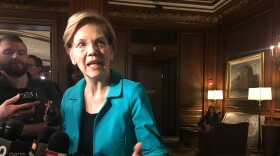"Altar to an Erupting Sun" is a work of fiction chronicling the life of a veteran environmentalist who's diagnosed with a terminal illness and takes a final dramatic stand against the climate catastrophe.
It’s the first novel by author Chuck Collins, who lives on a farm in Guilford, Vermont. We met up with him on a rainy day in a cabin in Deerfield, Massachusetts.
Chuck Collins, author: This is the cabin where Wally and Juanita Nelson lived. They were civil rights leaders. Wally was on the Freedom Rides in the '50s and the '60s. And then they moved to Woolman Hill here in Deerfield, where they had a subsistence farm, called the Bean Patch.
There's two reasons why we're here. One is, personally, I used to live down the road and would come up and sit at this dining room table with the Nelsons and talk to them about things that I was thinking about. And they always made me work out in the field for a couple of hours, kind of a barter in exchange for their knowledge and insight.
And then, in my novel, "Alter to an Erupting Sun," Juanita Nelson is a very important figure, a formative figure in the life of my main character, Rae Kelliher. So it's kind of poetic to be here and be back in this space and hear the rain on the roof, just like I did back in the '80s.

Carrie Healy, NEPM: So Rae Kelliher is the person whose life we learn about in your novel. She is a fictional character, but many of the characters in the novel are not. Why did you do that?
Well, it's kind of like historic fiction, where you have a fictional group of characters, but they're sort of moving through real things, real events that happen. So from a Pioneer Valley point of view: the Nelsons, and Sam Lovejoy, who toppled a tower to oppose a nuclear power plant, Brian Wilson, who is a Vietnam veteran who ran the veterans center in Greenfield and later lost his legs in an act of civil disobedience, blocking a train with munitions. These are real people. And the fictional Rae Kelliher sort of gets to know each of them and gets to know their stories and is partly formed and inspired by them.
And they are part of her community. What are you asking the reader to understand about their own community in reading this?
Well, part of it is to say our community is so important. Rae Kelliher, facing what she believes to be an ecological and economically disrupted future, looks to build even a stronger web of mutual aid and connection with her neighbors, with her extended family.
But it comes from her life experience. She moved to Montague at age 19 in 1973, and she lived at the Montague Farm, which was kind of a commune. So, living in community — not necessarily always sharing the same kitchen — but living in proximity with your friends and neighbors and being connected is a big part of how Rae sees how we're going to face the future together.
I'm a sometimes-librarian and widely read. I don't think that I've actually read a future fiction. Is this genre especially interesting for any specific reasons?
I think there is an emerging, you could call it, kind of near-future fiction. So it's not looking out centuries into outer space or whatever, but it's a way to imagine how we're going to live in the future.
And in the case of "Alter to an Erupting Sun," I try to build on, you know, what are some of the things that people are doing now in terms of regional resilience, food systems, welcoming immigrants and strangers who are being dislocated from other parts of the world to our area, access to land for housing and food growing, as well as new practices around death and dying? These are all parts of the world that Rae Kelliher inhabits and that she's sort of lifting up. And the future fiction part is imagining, how does that play out over the next 7 to 10 years?
You set up a real tension between two different characters in the book. What does that say about our own community and the way we should look at those around us?
Yeah. In this case, Rae has a brother, Toby, who's a couple of years older and who's really kind of introduced her to life in the woods and mushroom hunting and the beauty of the forest. But then, like a lot of families, they became polarized. Her brother Toby became kind of, you know, watched a lot of Fox News, sort of adopted a kind of a conservative right-wing perspective.
What's important, I think, in this story is Rae insists on staying connected to Toby, which is not always easy. But when they really were butting heads, she sort of hung in there. And in the end, that connection overrode the challenges and their differences. So I think that is part of our challenge right now is, how do we get to be in a real relationship?
There's not a lot of social media in this book. It was, you know, the author's prerogative.
There are cell phones, but there's not social media.
Yeah, there's a few old clunky flip phones, but these are not people who are sitting around looking at their phones and computers.
I kind of wanted to imagine a future that was more based on humans connecting with one another. And I do think that the sort of social media amplification of difference hasn't really helped us in the last couple of decades. So that's part of what's fun to imagine is, you know, maybe the people who are really politically divided, when it comes to living in a community and preparing for a disrupted future, maybe we have a lot more in common.







